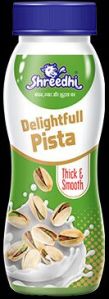HEALTH BENEFITS OF MILK According to the National Academy of Sciences, children and adults should drink 24 oz. of milk each day. Teens should drink even more — at least 32 oz. of milk a day. Further, the 2005 Dietary Guidelines for Americans released by the U.S. Department of Agriculture (USDA), give Americans a blueprint for good nutrition, including guidelines on including milk and milk products in a healthy diet. Why milk? We all know that the calcium in milk helps build strong bones, but milk is loaded with eight other essential vitamins and minerals. • Calcium: Helps build and maintain strong bones. It's also vital for nerve function, muscle contraction, and blood clotting. • Protein: Important for a number of bodily functions — vital to brain development and the growth of body tissues. • Vitamin A: Maintains normal vision and skin. Helps regulate cell growth and integrity of the immune system. • Vitamin B-12: Essential for the growth and health of the nervous system. Linked to normal activity of folic acid and is involved in bloodformation. • Vitamin D: Promotes the absorption of calcium and phosphorus, and influences bone mineralization, the strengthening of bones. • Potassium: Regulates the body's fluid balance and blood pressure. It also is needed for muscle activity and contractions. • Phosphorus: Helps generate energy in the body's cells and influences bone mineralization, the strengthening of bones. • Niacin: Keeps enzymes functioning normally and helps the body process sugars and fatty acids. It is also important for the development of the nervous system. • Riboflavin: Helps produce energy in the body's cells and plays a vital role in the development of the nervous system.



















